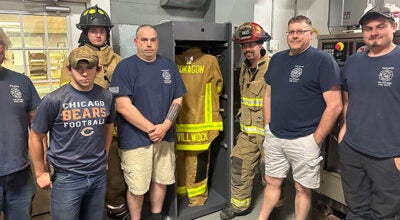Pennies made sense, but so does retail for church which opens transition house
Published 10:10 am Thursday, January 21, 2010

Manager Angela Walker at Hope's Door Thrift Store Jan. 20 with Apostolic Lighthouse volunteers Judy Springsteen and Candy Britton. Happy birthday, Candy. She turned 51 Wednesday. A grand opening is being planned for February. Hours are: Wednesday and Thursday, 10 a.m.-6 p.m.; Friday, noon-8 p.m.; and Saturday, 10 a.m.-4 p.m. All proceeds from the non-profit funds a transitional home that can accommodate six women at a time looking to rebuild their lives. Hope's Door, 132 S. Front St., carries clothing for men, women and children, toys and household goods. They currently have a nice selection of coats, hats and gloves and accept donations of all gently-used items. (The Daily News/John Eby)
By JOHN EBY
Dowagiac Daily News
Apostolic Lighthouse Church, M-62 West, Jan. 13 opened Hope’s Door Thrift Store at 132 S. Front St. between Wood Fire Italian Trattoria and Caruso Candy Kitchen in downtown Dowagiac to fund a transitional home for women looking to rebuild shattered lives.
Jerry Ostrowski’s storefront formerly housed Marci’s Variety until a fire upstairs. It also housed The Hairitage salon, which moved south on Front.
Manager Angela Walker, a church member, is “learning retail as I go” with the non-profit venture and drawing on the fact that “I like to shop in thrift stores. Several volunteers from the church help us out and everybody’s got ideas.”
“It’s doing quite well considering we were just getting our feet wet and haven’t started advertising yet,” Walker said Wednesday afternoon. “I’ve been very pleased with business. Do I see the economy recovering? I think Dowagiac is still hurting. Dowagiac has a ways to go before we completely recover.”
A grand opening is planned for February on a date to be determined, but probably near the ice festival on the 6th.
The 1995 Union High School graduate managed Pizza Hut in Berrien Springs and worked for the Dowagiac Pizza Hut “many years.”
She and her husband, Tom, have two children, Nathan and Rebecca, who attend Dowagiac Middle School.
“The Lord laid it on my heart to get involved with the thrift store,” she said. “We started a very small one in a storage closet just for church members out of the church. One thing led to another and here we are. We have everything, even a dryer. We sell a lot of clothing. I’d like to get into furniture, but we don’t have a whole lot of space for that. I think we’ll do a lot of children’s and ladies’ clothing. We want clean, gently used items. (Donations) are thoroughly inspected because we don’t intend on selling junk. A lot of people have stopped in” because the large sign is visible to passersby from Depot Drive.
Shoppers “may not know when they come in” what their purchases benefit, but “I take every opportunity I can to tell them about” the retreat and offers them a brochure.
The “generic” photo on the front is not actually Hope’s Door, but appears to be where author Michael Collins lives.
Proceeds from the thrift shop are earmarked to fund a transitional home for community women attempting to put their derailed lives back on track, such as those who may be going through a bad divorce, exiting an abusive relationship, coming out of drug or alcohol rehabilitation or making the transition back into society from incarceration.
Walker said Wednesday afternoon that the transition house, which can accommodate six women, was ready for occupancy in December.
“It is in town, but the location is confidential,” Walker said. “It’s open and available when we find someone who needs us. We have a ministry with the Cass County Jail and a team that goes in there and holds Navigators meetings once a week. That’s how they get introduced to our ministry.”
The thrift store accepts all types of donations, from apparel for all ages to household items and furniture.
Hope’s Door is similar to Goodwill, such as Dowagiac used to have next to Save-A-Lot, and St. Vincent dePaul on W. Railroad Street.
Hope’s Door Thrift Store is open Wednesdays and Thursdays from 10 a.m. to 6 p.m., Fridays from noon to 8 p.m. and Saturdays from 10 a.m. to 4 p.m.
The Apostolic Lighthouse began fundraising in 2008 with a million-penny drive.
“It’s a re-entry program,” Patricia Whitcomb, sister of Pastor David Helmuth, explained at the time.
“She’s still heavily involved,” Walker said. (Whitcomb) goes over there once in a while (to the jail), but it’s my sister-in-law who does the actual ministry over there” in Cassopolis.
Veronica Hetler is house manager for Hope’s Door.
“She blew up her house making meth many years ago now,” Walker said. “(WNDU-TV, Channel 16) did a story on her when she got clean and sober for a year or two. She called them up and said, ‘Hey, how about you do a positive story about somebody who’s turned their life around?’ They came out to our church, talked to our pastor, talked to Patty and did a story on Hope’s Door and women we intend to reach, like Veronica. She’s been there and done that and she’s currently taking classes at (Lake Michigan College) for social work and counseling.”
How long a woman stays at Hope’s Door is “open-ended, on a case by case basis,” Walker said.
“It’s completely up to the women who come. They don’t have to stay for any certain amount of time. They will work here to learn job skills and we will help them with anything else they need, such as getting a GED. One lady who was thinking about coming needs her citizenship. We help them work on themselves in group counseling. If they’re coming out of a drug situation, they have to be clean and sober for three months at least. We’re not rehab. To avoid going back into a place with a drug environment, they can come directly from jail to our home and start working on job skills, resume-building, group therapy where they can learn how to say no to people who want them to do negative things.”
“It’s not intended to institutionalize or be a permanent place to live,” Whitcomb said in May 2008. “What I have discovered in my research is that the majority of women in the prison system who are in rehab centers have never really had a work program. A lot of them have high school diplomas. Our goal – and we have a lot of lofty goals – is to get them training, to work with employment agencies. If you’ve got a felony on your record, it’s pretty hard to find employment unless you’ve got someone backing you. If you spend any time out at the jail at all, which I have had the privilege of doing this year, you meet a lot of hopeless people who don’t know what to do when they get out of there.
“Drugs in this area are quite a problem. There are a lot of addicted people. I know the need is there. Getting yourself right with your family, with yourself and with God are the three premises we intend to work on. Until you get right with yourself, you can’t get right with society or with God. You first have to like yourself to believe anybody else is going to like you.”
“I’ve been working down at Madison Center (in South Bend, Ind.), not for Madison Center, but in a situation of support for various people, and have just seen the devastation to people’s lives and the utter hopelessness,” Whitcomb said. “One of our board members had a visit with Sheriff Underwood and got a lot of statistics. His comment was, ‘We send them out the front door and they come right around to the back door, and we have nothing safe for them to go to. They do their time and go back into the same environment with no job, no skills.’ Of course they’re going to be back (in jail), and who do you think is paying for that?”
Whitcomb can distinguish between a bad person and a drug addict because she’s a recovered addict herself.
“I spent years addicted to cocaine and alcohol,” she said. “I’m luckier than most in that I did have an education and that I do have a family who is supportive and never quit praying for me, the black sheep of the family. I have been there and I believe women carry a guilt and a shame where our families are concerned.”
The premise behind the penny drive was that “it costs more to make a penny than a penny’s worth. Our whole thought is helping people who have been thrown away. Basically, society says, ‘So what? They’re crackheads. So what if they destroy themselves?’ But in saying that, you’re not realizing here are children and you’re bringing another generation into the same hopeless cycle. Those children will be taking care of us when we’re old and running our government. There is a huge cost to society for all of this. If you can turn souls around, one at a time, you’re saving society a burden as well as that person.”
When she was two years into sobriety, Whitcomb tackled the task of starting a daycare facility for the Lighthouse.
Now 14 years old, it is directed by Whitcomb’s niece, Dowagiac Board of Education member Michelle Helmuth.
“Nobody thinks a pastor’s sister would have these kinds of things in her background,” Whitcomb said. “It’s really only been in the last year that I could openly talk about my addictions because I’m helping other people now with them. It really heals a lot of those scars for me which go pretty deep. Addictions are not easy to overcome and can happy to anybody.
“The more educated you are and the more self-reliant you are, the more in denial you are until the bottom drops out of your world and you have to face facts. That’s kind of what happened to me. I’m looking at this from first-hand experience. People who have not been there say, ‘Just Say No.’ ”
Whitcomb, who studied business in college, always worked in marketing and sales. She came to Dowagiac more than 15 years ago after living in southern California most of her adult life.
Four Helmuth children grew up in Sawyer with a father who was a minister. George, born in Oklahoma, passed away Oct. 15, 2007, at 88 after 51 years as a pastor who established churches in Battle Creek and, in Berrien County, in Bridgman and Three Oaks.
Patricia is the oldest. David “was the baby for eight years, then they had another one,” Debra. “The three of us,” including George Jr. and the pastor, “were like the Three Musketeers growing up. My family has always been involved in serving people and helping people. As children, I think I sort of resented it, but my dad influenced a multitude of people. I always said I wasn’t rebelling when I got into drugs, but I don’t know.
“I had a good career. The drinking started because in sales and marketing, you do it over a drink. Drugs were part of the culture back then, but I never would have anything to do with them because I had a job to do and I couldn’t mess with that stuff, but one thing led to another and, before I knew it, I was addicted to cocaine and freebasing. I got down to 95 pounds and was so weak I couldn’t get out of bed because you don’t eat when all you want to do is smoke dope.”






